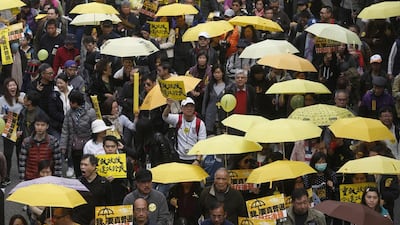Faced with a wall of official intransigence, the young activists of the so-called Umbrella movement in Hong Kong were eventually forced to leave the sites they had occupied last autumn without gaining any of the concessions they demanded from the Hong Kong government and Beijing.
But when the umbrellas folded, the shopping revolutionaries moved in. And while the original protesters limited their demands to universal suffrage within the One Country-Two Systems framework, a new generation of radicals are aiming for something different: full autonomy, or independence for Hong Kong.
Nativism, as expressed through a variety of small “bentupai” or local faction groups, has been a visible presence on Hong Kong’s political fringe since the 2011 publication of Horace Chin Wan-Kan’s On the Hong Kong City State.
Dr Chin, a local folklorist and former civil servant, argues that Hong Kong represents a traditional and superior manifestation of Chinese culture, one that was preserved under British rule, while being destroyed in China under communism. Without independence, the argument goes, Hong Kong now risks being overcome by a tide of “mainlandisation”.
Since the book’s publication, Hong Kong autonomists have played a small but highly visible role in public protest, often while waving colonial era Hong Kong flags. This is to the discomfort of more traditionally minded democratic activists, many of whom still identify as Chinese patriots. Autonomists have also staged small but growing counter-demonstrations before the annual June 4 commemoration vigil, the traditional red letter day of the wider Hong Kong pan-democratic movement.
Autonomists also made their presence felt in last autumn’s occupation, led by the Civic Passion and Hong Kong Indigenous groups and displaying what looked like classic entryist tactics: jumping on a bandwagon started by others and then trying to steer it in their preferred direction.
They succeeded, to an extent, by becoming the last protesters standing. Most activists retreated when the police finally broke up the camps.
The nativists kept on going, staging a series of “shopping revolution” protests in which businesses popular with mainland tourists were aggressively picketed. These later morphed into a campaign against so called parallel trading, in which groups of vigilantes stalked areas popular with mainland visitors, looking for small-scale smugglers.
This led to some ugly scenes, since the activists were often none-too fussy about who they decided was a smuggler. Hong Kong’s pro-Beijing press have been quick to leap on images of old men being shoved over in the street because they were carrying too many shopping bags and young women with children subjected to sustained verbal abuse.
Something had changed – and not for the better. Last September, Hong Kong was widely seen as a city in which the people were rising up for their rights. This year, Hong Kong seems to be the only place on Earth where it is acceptable in some political quarters for Chinese people to be physically harassed on the basis of their nationality.
Ugly as the strategy might be, it appears to be getting results among the activist base previously aligned with Hong Kong’s wider pan-democratic movement. The citywide Hong Kong Federation of Students, which effectively led the Occupy movement, has been hit by a wave of disaffiliation motions from its constituent universities. And the student body itself has withdrawn from the official June 4 commemoration, apparently under pressure from students who want a more local focus for protest.
It’s not that the wider activist community share the cultural chauvinism of the bentupai groups. Many see a Hong Kong identity as part of a cosmopolitan commitment to universal human rights. Perhaps most think that their democratic ideals are simply unrealisable within the one country-two systems framework.
How Hong Kong autonomy is supposed to be realised in practice is, to be kind about it, a work in progress. Under one scheme, Hong Kong somehow gives itself back to the UK, which then grants it independence within the Commonwealth. There are also other equally implausible plans to create local self-defence forces to stand against the PLA and to overcome Hong Kong’s resource deficiency by building reservoirs and giving the rural New Territories over to agriculture. Often the question is fudged along the lines of Hong Kong built itself up without China, why can’t it do so again?
Beijing and its local supporters have found the Hong Kong nativists a useful cudgel with which to pressure the pan-democrats. But it is probably the pan-democrats who have most to lose from their rise. The Hong Kong legislature is shortly to vote on Beijing’s plan for the chief executive elections of 2017, in which a selection of vetted candidates will be offered to the public.
This was the plan that sparked the original occupation of September 2014. Hong Kong’s pan-democrats have vowed to veto the proposal, despite the fact that Hong Kong public opinion has shifted from being firmly opposed to almost equally divided on the issue.
If they maintain their veto, the pan-democrats risk being punished by the section of the electorate that now thinks Beijing’s offer is better than nothing. But if they vote for it, they risk seeing their activist base shift decisively over to the nativist camp.
Beijing, meanwhile, seems set to benefit from a new angle on the adage about divide and rule. Simply by ruling for long enough, Beijing is now witnessing its opponents dividing among themselves.
Jamie Kenny is a UK journalist and writer specialising in China

